
IP FRAGMENTATION AND MEASURES AGAINST DNS-CACHE-POISONING
Roland van Rijswijk-Deij (NLnetLabs), Patrick Koetter (sys4), Carsten Strotmann (sys4)
Created: 2021-12-15 Wed 15:39
All content © 2021 Internet Systems Consortium, Inc.


About the project
- Study under contract from BSI (German Federal Office for Information Security) between December 2019 and September 2021
- Roland van Rijswijk-Deij (NLnetLabs), Patrick Koetter (sys4), Carsten Strotmann (sys4)
- Questions:
- Do DNS cache poisoning attacks via fragmentation impose a real threat?
- Is it possible to mitigate such attacks?
- How effective are these mitigations?
All content © 2021 Internet Systems Consortium, Inc.


DNS cache poisoning via DNS fragmentation
All content © 2021 Internet Systems Consortium, Inc.


Example attack (simplified)
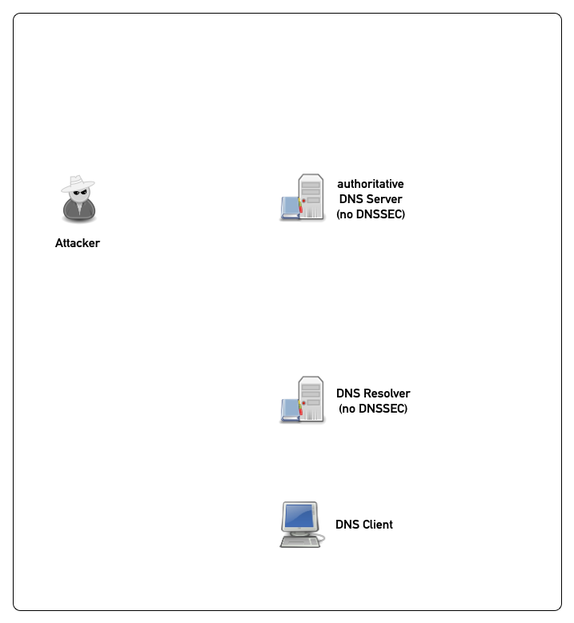
All content © 2021 Internet Systems Consortium, Inc.


Example attack (simplified)
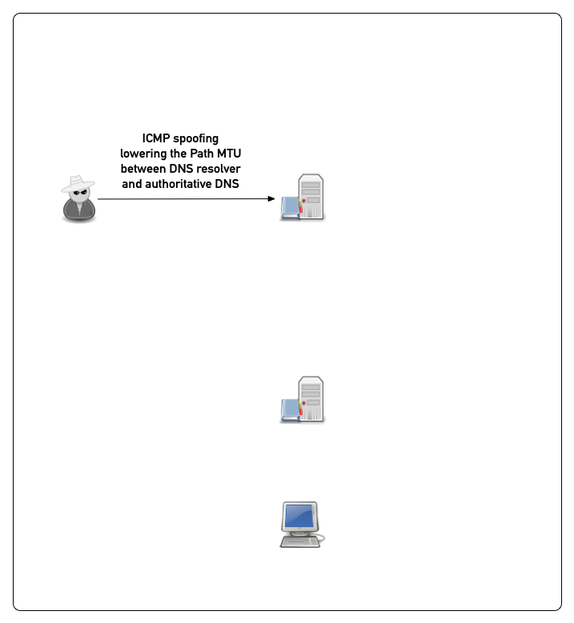
All content © 2021 Internet Systems Consortium, Inc.


Example attack (simplified)
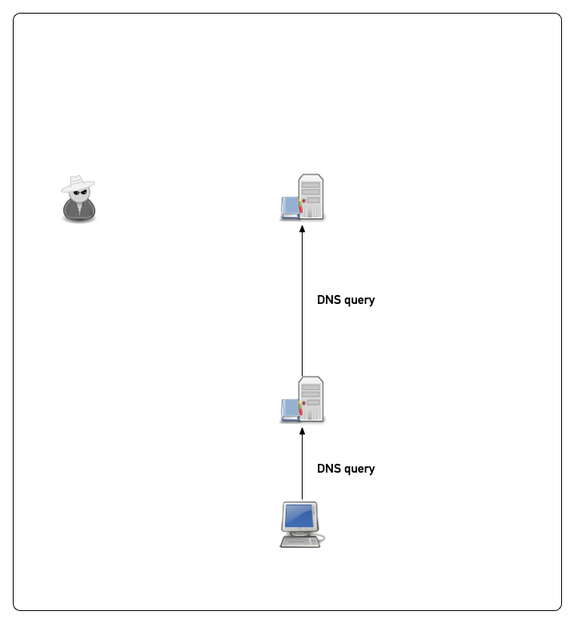
All content © 2021 Internet Systems Consortium, Inc.


Example attack (simplified)
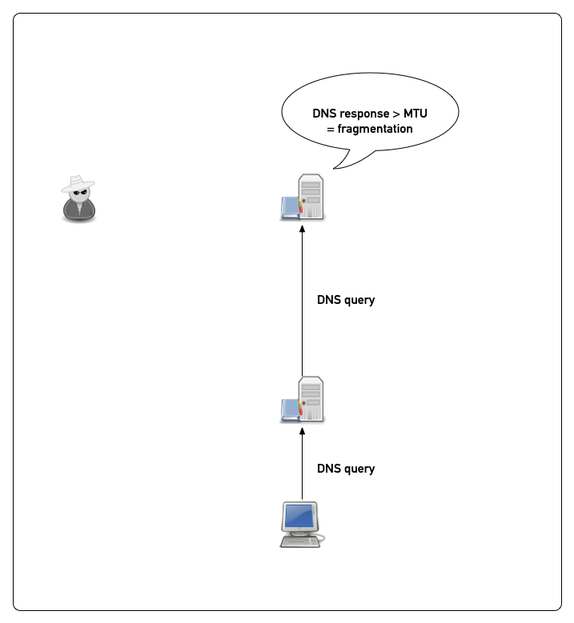
All content © 2021 Internet Systems Consortium, Inc.


Example attack (simplified)
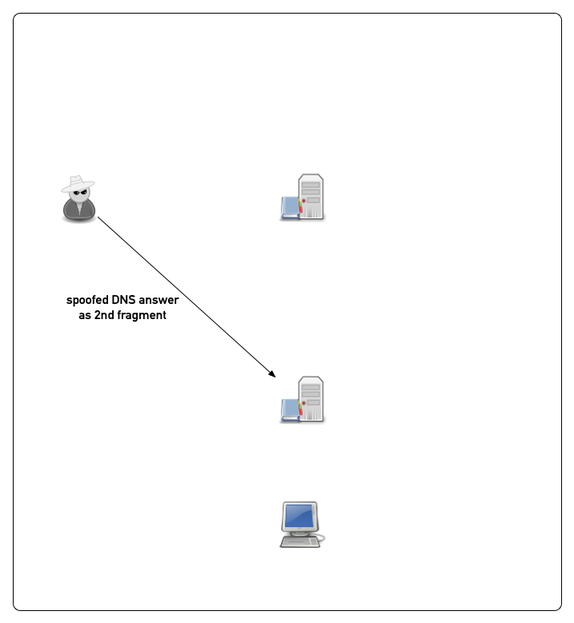
All content © 2021 Internet Systems Consortium, Inc.


Example attack (simplified)
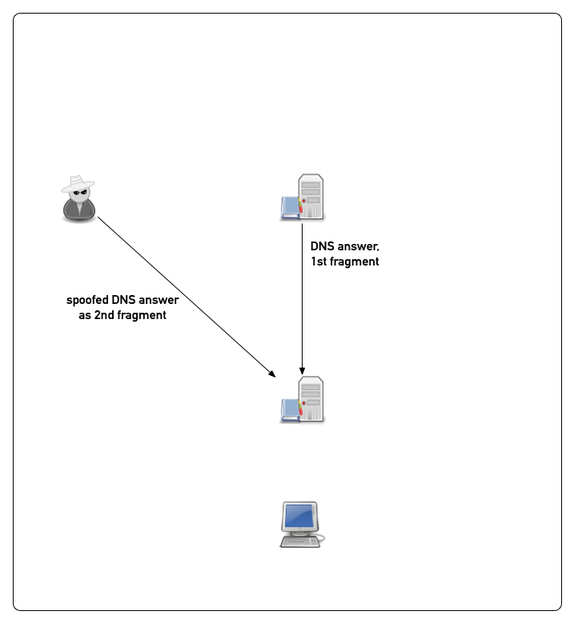
All content © 2021 Internet Systems Consortium, Inc.


Example attack (simplified)
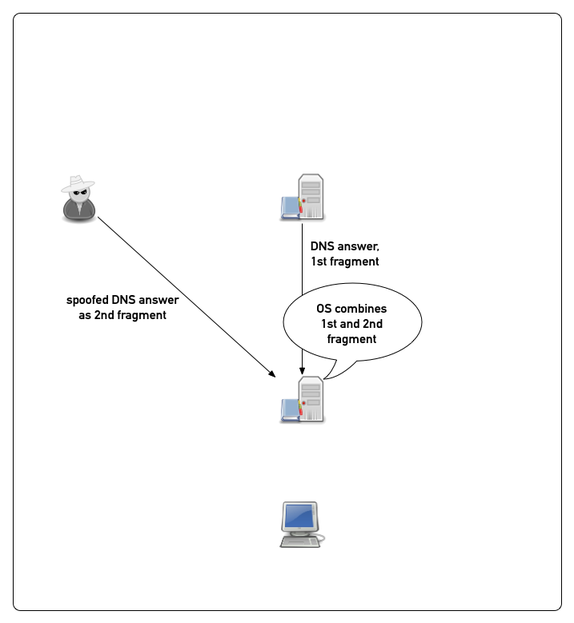
All content © 2021 Internet Systems Consortium, Inc.


Example attack (simplified)
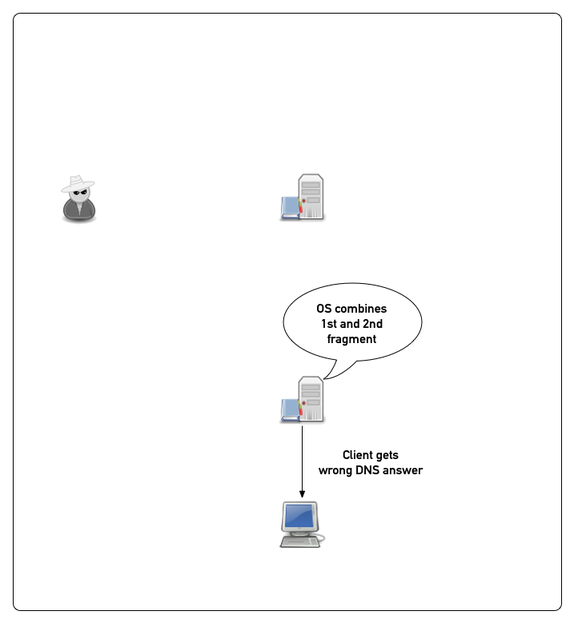
All content © 2021 Internet Systems Consortium, Inc.


DNS fragmentation on an ISP DNS resolver
All content © 2021 Internet Systems Consortium, Inc.


DNS fragmentation as perceived on an ISP DNS resolver
- Measurement of number, size and source of fragmented DNS responses on a DNS resolver
- Conducted in July 2020 at a large German ISP with about 4 million home and business Internet access customers
All content © 2021 Internet Systems Consortium, Inc.


DNS fragmentation on an ISP DNS resolver
- IPv4: 55 064 DNS responses from a total of 54 023 478 have been fragmented (0.10 %)
- IPv6: 104 129 DNS responses from a total of 96 620 298 have been fragmented (0.11 %)
- DNSSEC: 93% (IPv6) and 97% (IPv4) of fragmented DNS answers came from DNSSEC signed zones
All content © 2021 Internet Systems Consortium, Inc.


Fragmented DNS responses distribution per 24 hours
Number of fragmented DNS responses seen over 24 hours
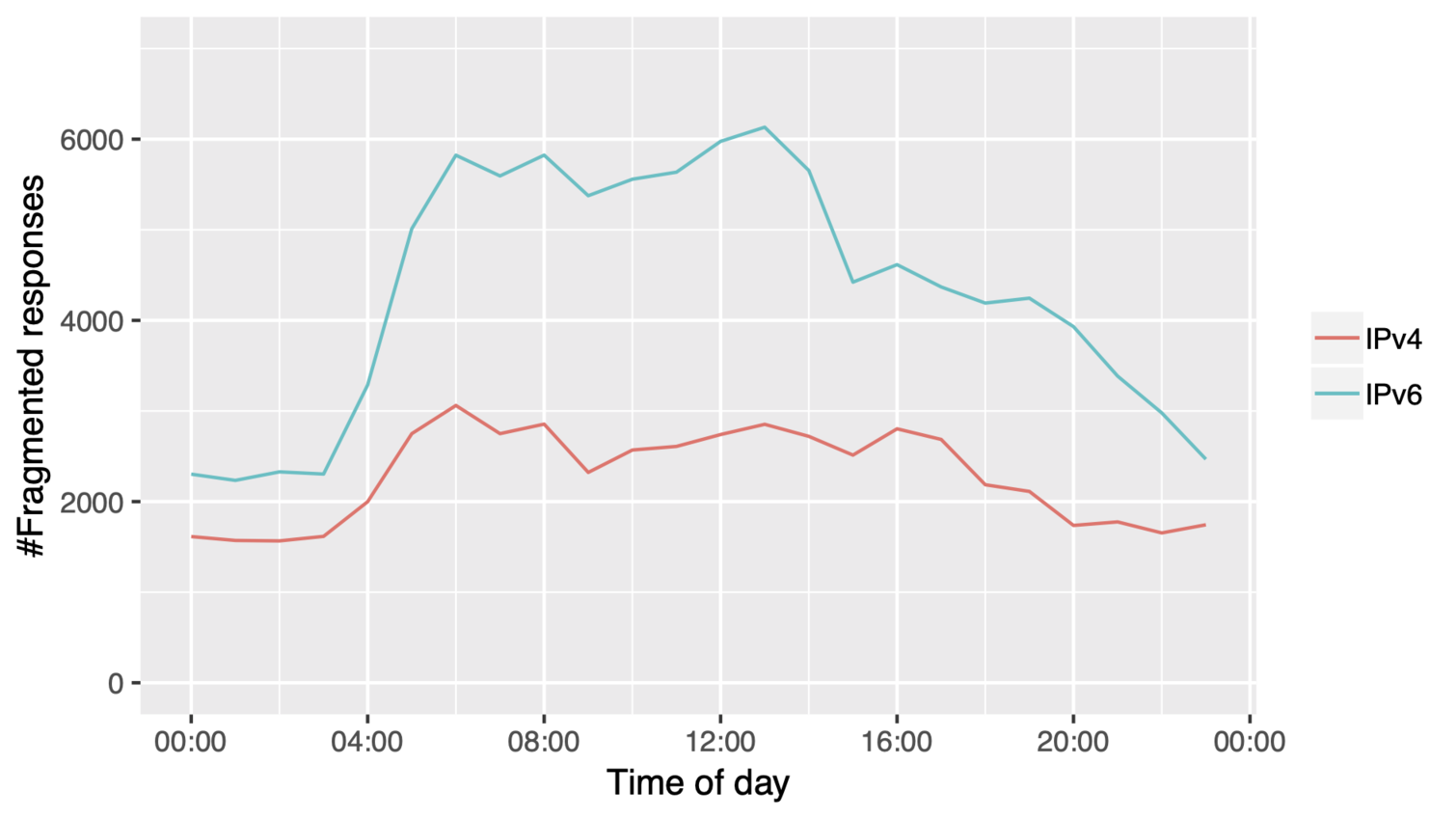
All content © 2021 Internet Systems Consortium, Inc.


Fragmented DNS responses distribution per 24 hours
Percentage of fragmented DNS responses from the total number of responses over 24 hours
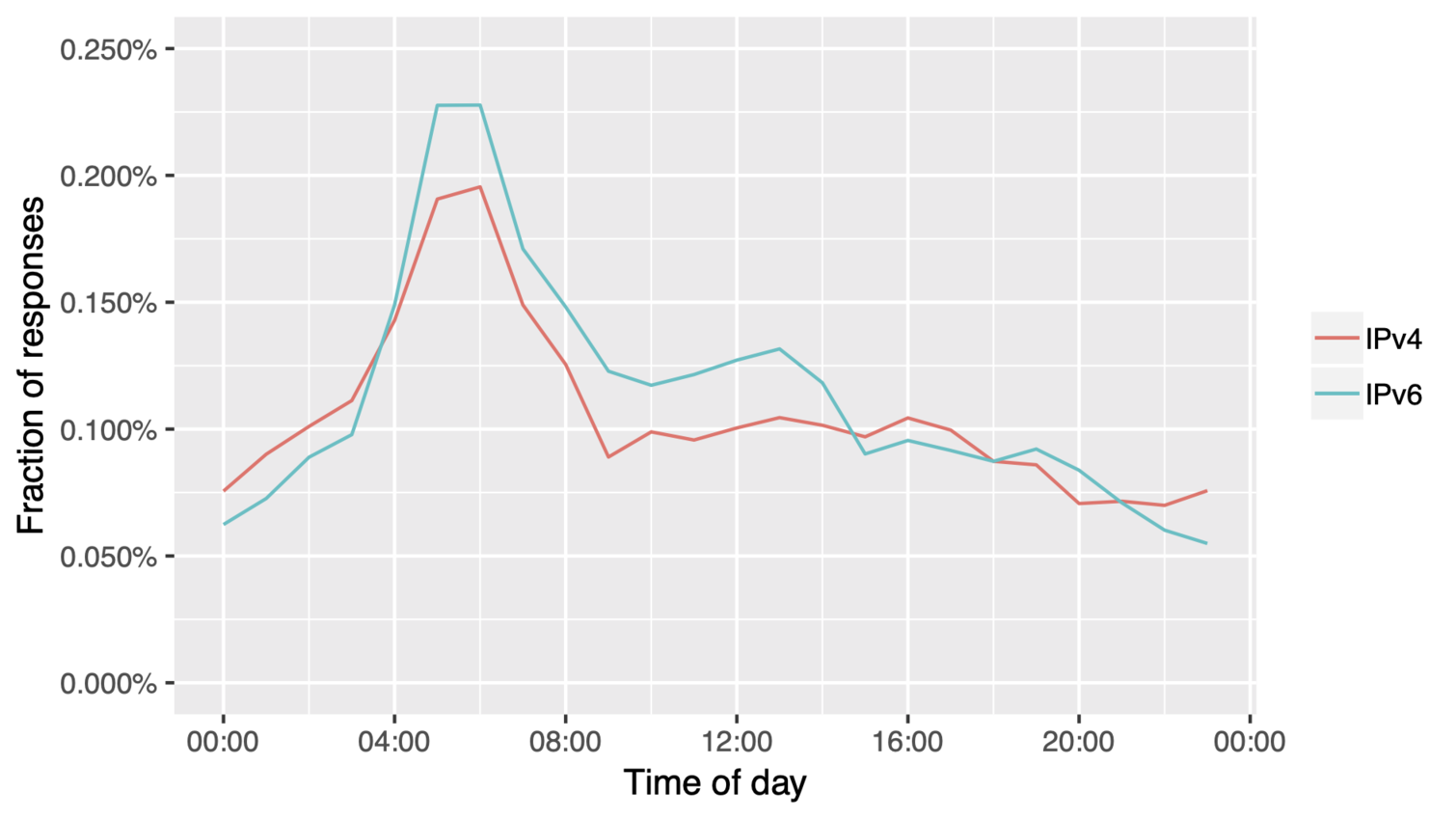
All content © 2021 Internet Systems Consortium, Inc.


DNS Server sending fragmented DNS responses
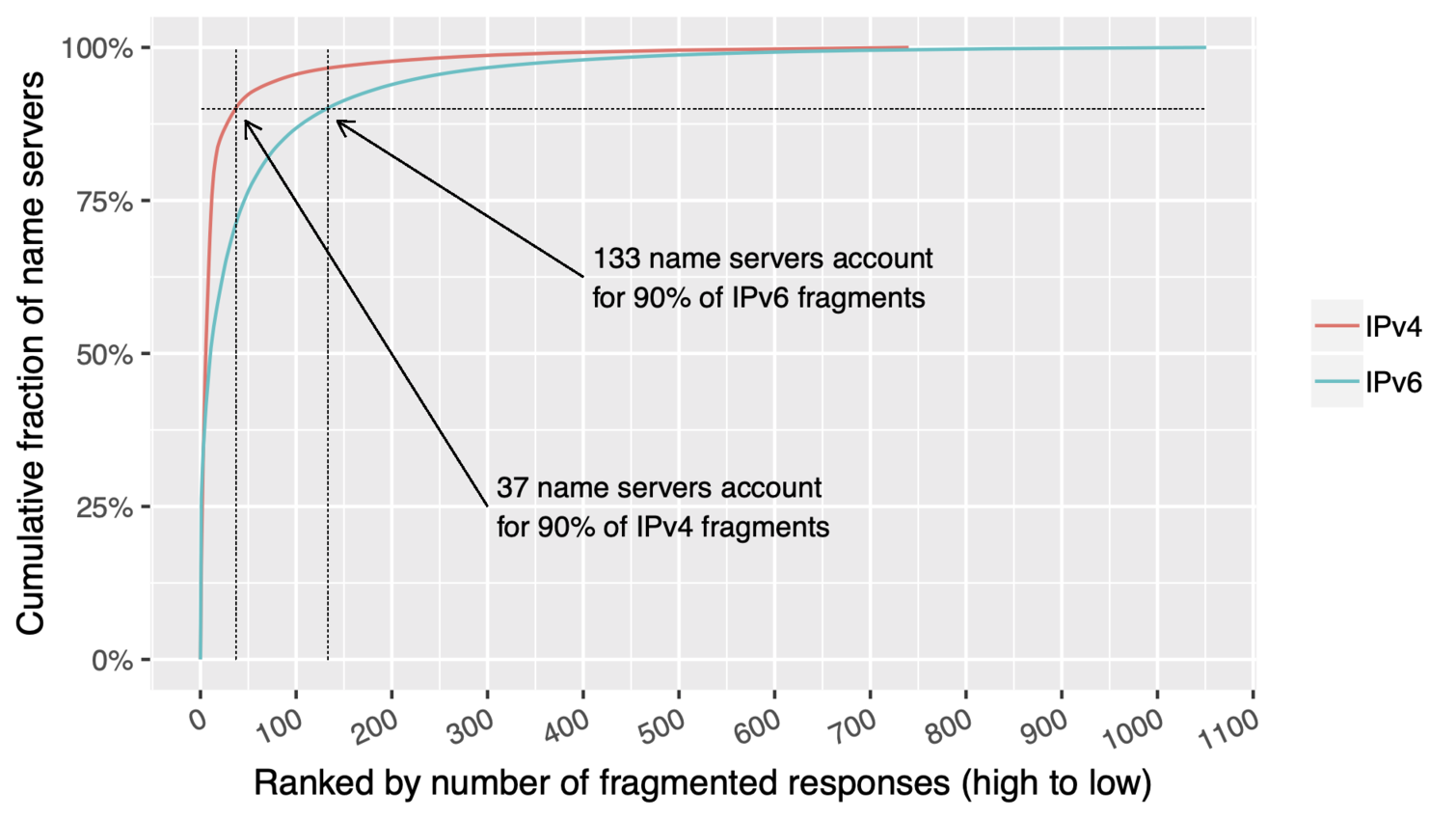
All content © 2021 Internet Systems Consortium, Inc.


Notable domains with fragmented DNS responses
- Domains from where fragmented DNS responses have been seen
- office.com (Microsoft)
- army.mil (US Army)
- fnfis.com (Fidelity National Information Services)
- ekom21.de (kommunales Gebietsrechenzentrum Hessen)
- fraunhofer.de (Fraunhofer Gesellschaft)
- rwe.de (RWE Aktiengesellschaft)
- agilent.com (Agilent, Research)
- checkpoint.com (Check Point Security - Firewall and VPN products)
- salesforce.com and force.com (Salesforce.com, Inc - Cloud based customer relationship management solutions)
- fedex.com (FexEx Corporation - multi national delivery services company)
- gnome.org (Gnome Desktop Software - open source GUI desktop for Linux and Unix)
All content © 2021 Internet Systems Consortium, Inc.


Fragmented DNS responses sent from authoritative DNS server
All content © 2021 Internet Systems Consortium, Inc.


OpenINTEL
- OpenINTEL is an Internet research platform that collects DNS responses from 227 000 000 DNS domains
- OpenINTEL observes around 60% of the public Internet
- OpenINTEL processes 2.4 billion DNS datasets per day
- This study looked into the fragmentation seen in NS, A and AAAA DNS responses
All content © 2021 Internet Systems Consortium, Inc.


How much DNS fragmentation is seen by OpenINTEL?
- 3 893 453 582 DNS responses
- IPv4: 2 837 177 438 [72.870%]
- IPv6: 1 056 276 144 [27.130%]
- fragmented responses
- IPv4: 1 334 549 [0.047%]
- IPv6: 1 008 894 [0.096%]
All content © 2021 Internet Systems Consortium, Inc.


OpenINTEL: Size of DNS datagrams over IPv6
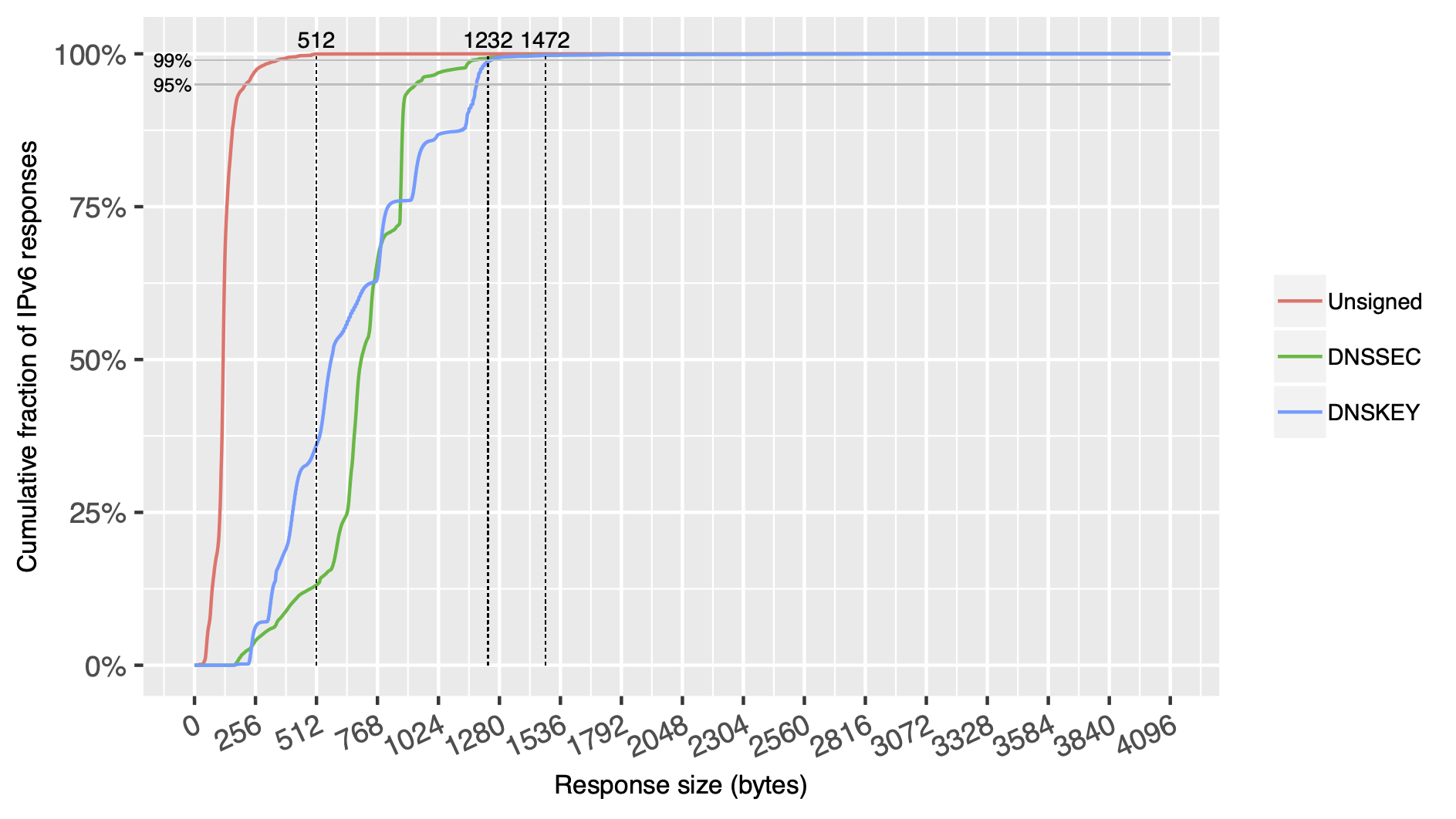
All content © 2021 Internet Systems Consortium, Inc.


OpenINTEL: Size of DNS datagrams over IPv4
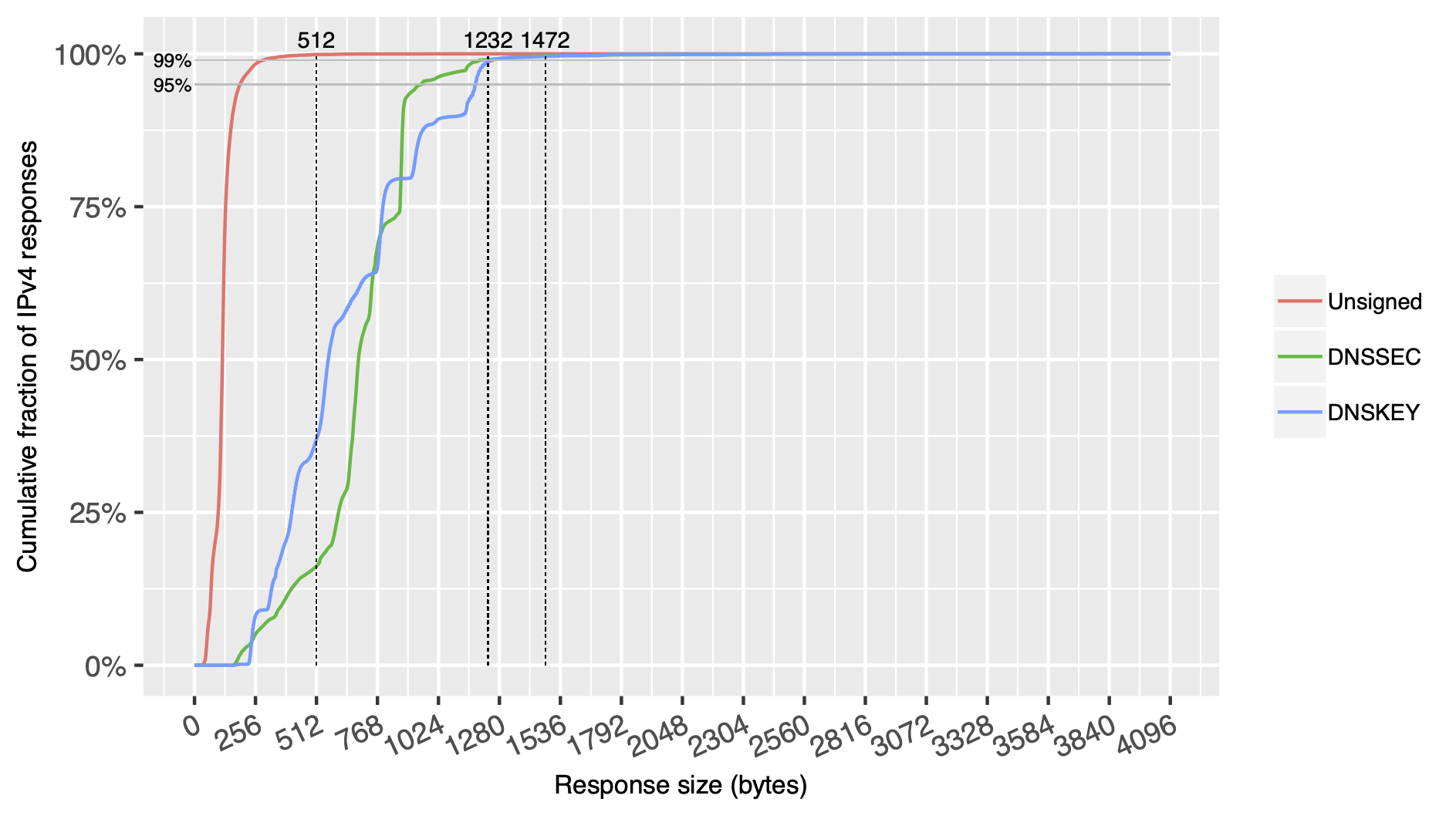
All content © 2021 Internet Systems Consortium, Inc.


OpenINTEL: Size of the advertised EDNS buffer
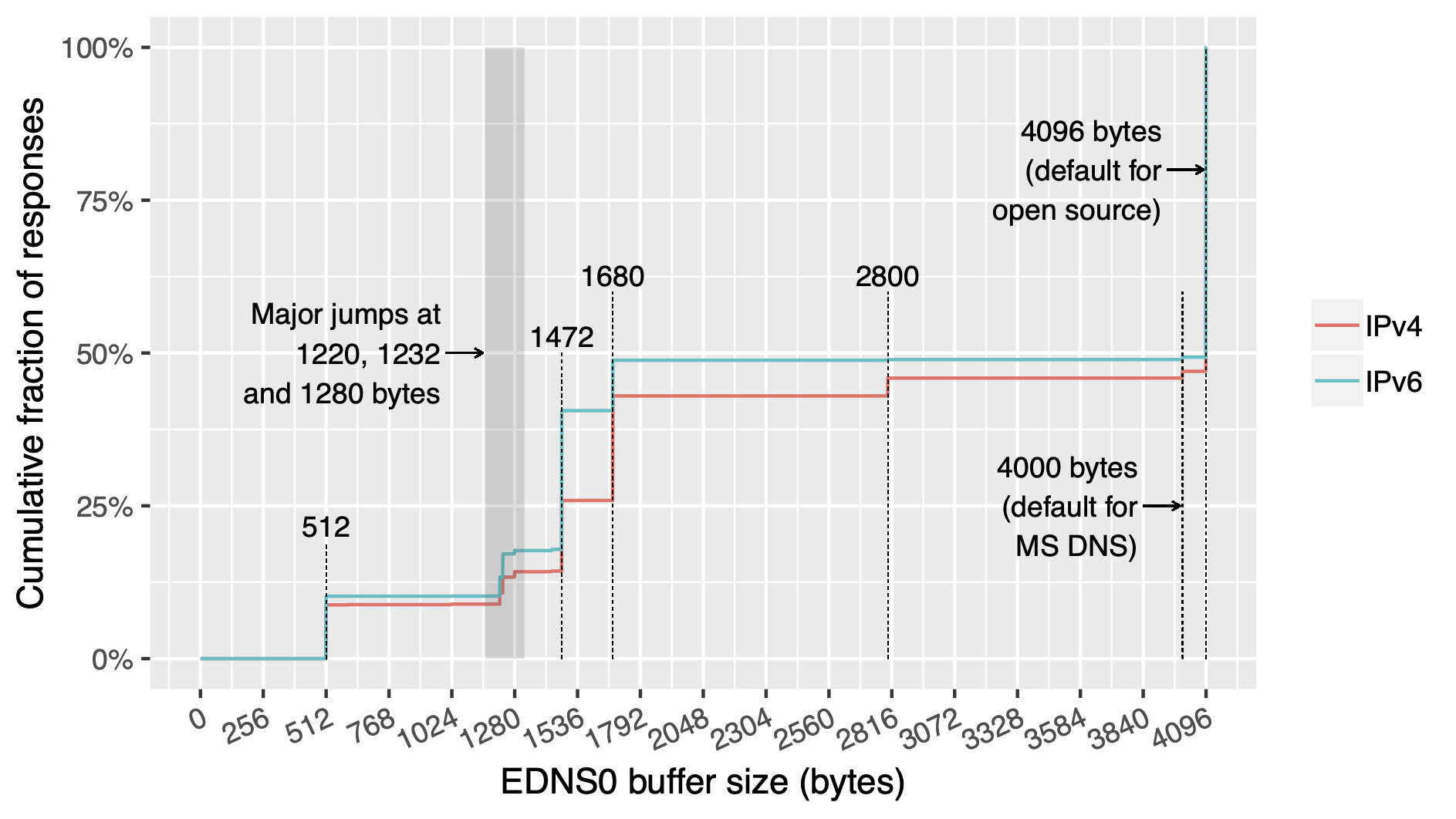
All content © 2021 Internet Systems Consortium, Inc.


Authoritative DNS servers supporting TCP
All content © 2021 Internet Systems Consortium, Inc.


Authoritative DNS servers supporting TCP
- A DNS response that does not fit into an UDP response must be sent over TCP
- Response size limits of DNS UDP messages:
- 512 Byte: classic DNS RFC 1034/1035 (1987)
- 4096 Byte: EDNS RFC 2671 (1999)
- 1232 Byte: popular recommendation to prevent DNS fragmentation
- Question: How many authoritative DNS servers support DNS/TCP?
- How popular are the domains that are hosted on DNS sever that do not support DNS/TCP?
All content © 2021 Internet Systems Consortium, Inc.


TCP Support
- 879 345 IPv4/IPv6 addresses of authoritative DNS server
- This DNS server are authoritative for 202 765 149 domains
- 197 773 383 (97.57%) of these domains have at least one DNS server offering DNS/TCP
- From 183 549 827 (90.55%) domains all announced DNS servers (NS Record) offer DNS/TCP
- 4 925 715 (2.43%) of the surveyed domains have no DNS server supporting DNS/TCP
All content © 2021 Internet Systems Consortium, Inc.


TCP Support
- Domains where at least one DNS server does not support DNS/TCP contain
popular Internet destinations such as
live.com,office.com(Microsoft) andyahoo.com(Yahoo) - 1.5% of all domains of the Tranco 1M list (list of the 1 million most popular Internet domains) have no DNS server with TCP support
All content © 2021 Internet Systems Consortium, Inc.


Rank of Tranco 1M domains lacking TCP support
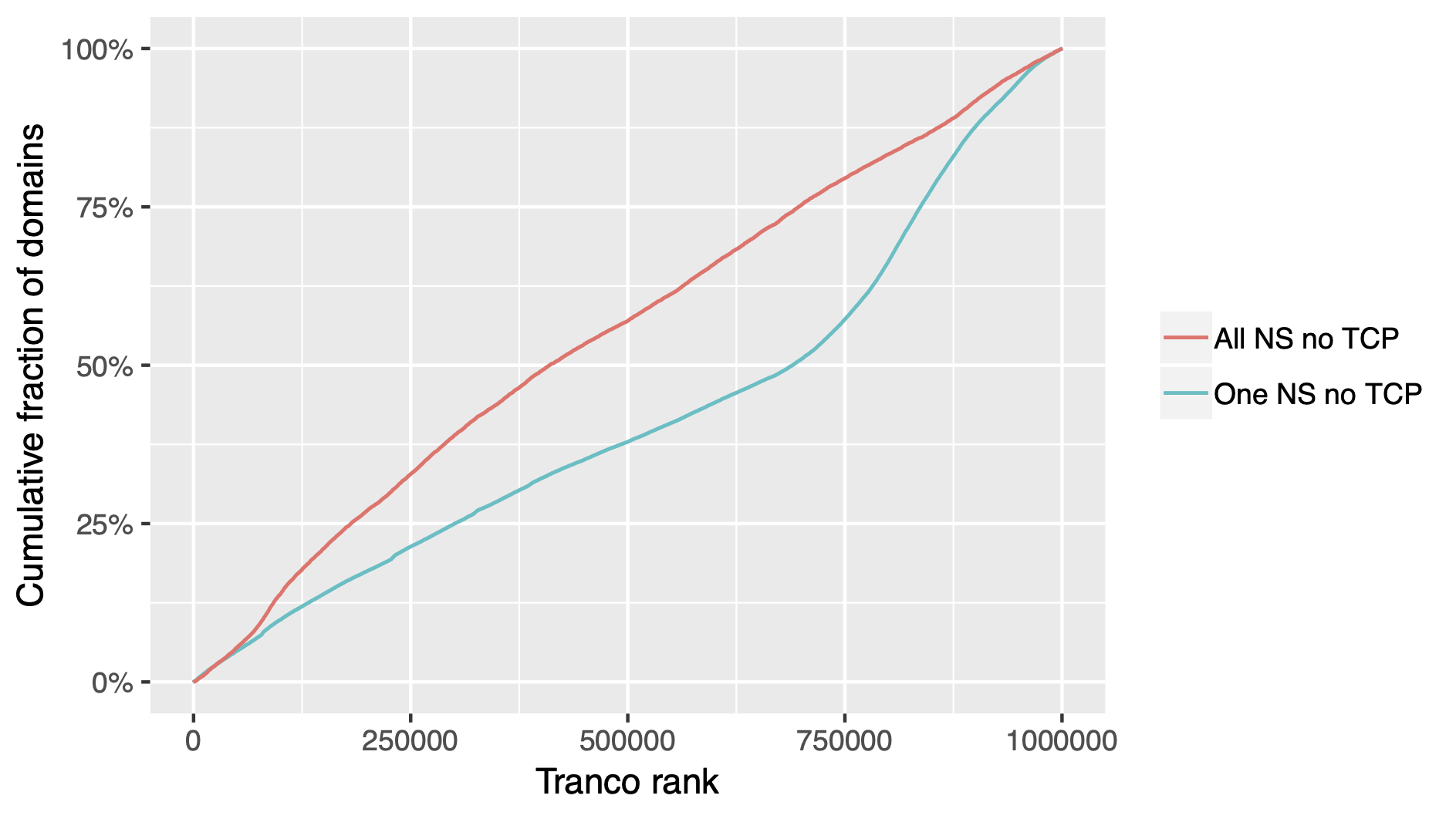
All content © 2021 Internet Systems Consortium, Inc.


DNS/TCP Support - Conclusion
- Few, but also some popular domains do not support DNS over TCP
- Usage of DNS over TCP to mitigation DNS fragmentation attacks is therefore not recommended
All content © 2021 Internet Systems Consortium, Inc.


ICMP Spoofing Vulnerabilities
All content © 2021 Internet Systems Consortium, Inc.


Which Operating Systems are vulnerable to ICMP PathMTU Spoofing?
- To increase the success of a DNS attack via fragmentation, a
attacker would try to lower the Path-MTU between the DNS resolver
and the authoritative DNS server
- This can be done by sending spoofed ICMP error messages
- Question: Which popular operating systems are vulnerable to ICMP Path-MTU spoofing?
All content © 2021 Internet Systems Consortium, Inc.


Operating-Systems and ICMP Path-MTU Spoofing
- Tested the vulnerability of popular operating systems for ICMP Spoofing in a lab environment
- Question: Would an authoritative DNS server send fragmented DNS responses after a successful Path-MTU spoofing attack?
All content © 2021 Internet Systems Consortium, Inc.


Operating Systems and ICMP PathMTU Spoofing
| Operating System | minMTU IPv4 | minMTU IPv6 | success IPv4 | success IPv6 |
|---|---|---|---|---|
| Debian 6 / Kernel 2.6.32-5-amd64 | 552 | 1.280 | X | X |
| Ubuntu 14.04.1 / Kernel 3.13.0-45-generic (12/2014) | 552 | 1.280 | X | X |
| Ubuntu 14.04.1 LTS / Kernel 3.13.0-170-generic (05/2019) | 552 | 1.280 | X | X |
| Ubuntu 16.04.6 LTS / Kernel 4.4.0-184-generic (06/2020) | 552 | 1.280 | X | X |
| Ubuntu 18.04.4 LTS / Kernel 4.15.0-106-generic (06/2020) | 1.500 | 1.280 | - | X |
| CentOS 6 / Kernel 2.6.32-504.3.3.el6.x86_64 (12/2014) | 552 | 1.280 | X | X |
| CentOS 7 / Kernel 3.10.0-1127.10.1.el7.x86_64 (06/2020) | 1.500 | 1.280 | - | X |
| CentOS 8 / Kernel 4.18.0-147.8.1.el8_1.x86_64 (04/2020) | 1.500 | 1.280 | - | X |
| SUSE EL 15SP1 / Kernel 4.12.14-197.45-default (06/2020) | 1.500 | 1.280 | - | X |
| FreeBSD 12.1 / Kernel 12.1-RELEASE r354233 GENERIC amd64 | 1.500 | 1.280 | - | X |
| OpenBSD 6.7 / Kernel 6.7 GENERIC#234 i386 | 1.500 | 1.280 | - | X |
| Windows Server 2008R2 | 1.500 | 1.280 | - | X |
| Windows Server 2012R2 | 1.500 | 1.280 | - | X |
| Windows Server 2016 | 1.500 | 1.280 | - | X |
| Windows Server 2019 | 1.500 | 1.280 | - | X |
All content © 2021 Internet Systems Consortium, Inc.


Operating Systems used for DNS Server
- The popular BIND 9 DNS server software responds with it's version
number over DNS on request
- This version number often contains the version of the Linux-Kernel and the version of the Linux distribution
- We've used OpenINTEL to query for the versions used on authoritative DNS server
All content © 2021 Internet Systems Consortium, Inc.


Operating Systems used for DNS Server (Summer 2020)
| Linux OS | Number of Server | Percent from total |
|---|---|---|
| RedHat Linux | 240.481 | 28.2% |
| RedHat EL5 | 7.876 | 0.9% |
| Redhat EL6 | 98.443 | 11.5% |
| RedHat EL7 | 121.103 | 14.2% |
| RedHat EL8 | 1.594 | 0.2% |
| Ubuntu Linux | 25.034 | 2.9% |
| Ubuntu 14.04 | 5.110 | 0.6% |
| Ubuntu 16.04 | 9.314 | 1.1% |
| Ubuntu 18.04 | 9.467 | 1.1% |
All content © 2021 Internet Systems Consortium, Inc.


Operating-Systems and ICMP Path-MTU spoofing - conclusion
- Windows operating systems are not vulnerable (to Path-MTU spoofing)
- Older Linux-Kernel are vulnerable
- These older Linux-Kernel are still in use in long-term support Enterprise-Linux systems!
- The vulnerable Linux versions are used for authoritative DNS server on the Internet
All content © 2021 Internet Systems Consortium, Inc.


IP Fragmentation, DNS and TCP
- A joint study of Tianxiang Dai, Dr Haya Shulman and Professor
Michael Waidner (Summer 2021) found that DNS communication over TCP
can also be vulnerable to IP fragmentation attacks
- Attacking DNS-over-TCP with IP fragmentation is very similar to attacks on DNS-over-UDP traffic
The recommendations to move to TCP to avoid the fragmentation attacks that apply to UDP, do not solve the problem.
- https://blog.apnic.net/2021/11/09/dns-over-tcp-considered-vulnerable/
- https://www.youtube.com/watch?v=MAfvUbwktOM&t=2285s
All content © 2021 Internet Systems Consortium, Inc.


Recommendations
All content © 2021 Internet Systems Consortium, Inc.


RECOMMENDATIONS FOR DNS RESOLVER OPERATORS
- Use the default Ethernet MTU in DNS server networks
- Restrict the DNS response size over UDP (1 232 Byte)
- Support DNS over TCP
- Evaluate the security risks of running long term supported OS
- Drop Fragmented DNS Responses
- Monitor DNS Traffic for DNS fragmentation
All content © 2021 Internet Systems Consortium, Inc.


RECOMMENDATIONS FOR OPERATORS OF AUTHORITATIVE DNS SERVERS
- Use the default Ethernet MTU in DNS server networks
- Restrict the DNS response size over UDP (1 232 Byte)
- Support DNS over TCP
- Evaluate the security risks of running long term supported OS
- Deploy DNSSEC Signed Zones
- Avoid Large DNS Resource Record Sets
- Minimize "ANY" Responses
- Enable Minimal Responses
All content © 2021 Internet Systems Consortium, Inc.


Conclusion
All content © 2021 Internet Systems Consortium, Inc.


Conclusion (1/2)
- It is possible to attack DNS content by means of DNS fragmentation
- The amount of natural (non attack) DNS fragmentation in the Internet is minimal yet still significant
- Popular domains are vulnerable
- Fragmentation of DNS responses should be avoided
- Among the tested mitigations, lowering the EDNS buffer is the
most effective one
- once the EDNS buffer is lowered, no natural fragmentation should occur. All remaining fragmentation can be dropped at (host-)firewall level
- Among the tested mitigations, lowering the EDNS buffer is the
most effective one
All content © 2021 Internet Systems Consortium, Inc.


Conclusion (2/2)
- The mitigations against DNS fragmentation focus on the effect and do not eliminate the cause
- DNS cache poisoning and many other attacks on DNS infrastructure would cease to exist if operators began to DNSSEC-sign their DNS zones and DNS resolvers would DNSSEC-verify DNS responses by default
All content © 2021 Internet Systems Consortium, Inc.


The future
- The DNS protocol is seeing significant changes these days:
- new encrypted transport protocols such as DNS-over-TLS and DNS-over-HTTPS are being deployed
- QUIC is a new transport protocol being standardized in the IETF, DNS-over-QUIC might replace the classic DNS-over-UDP in the future
- These new transport protocols (might) solve the problems with fragmentation for DNS
- But it will be likely more than a decade until widespread deployment is being seen in the Internet
All content © 2021 Internet Systems Consortium, Inc.


Questions?

All content © 2021 Internet Systems Consortium, Inc.
